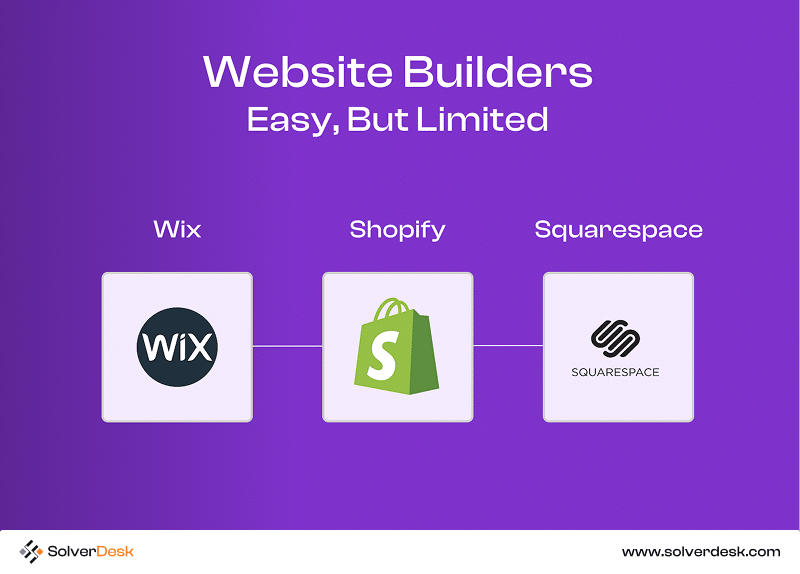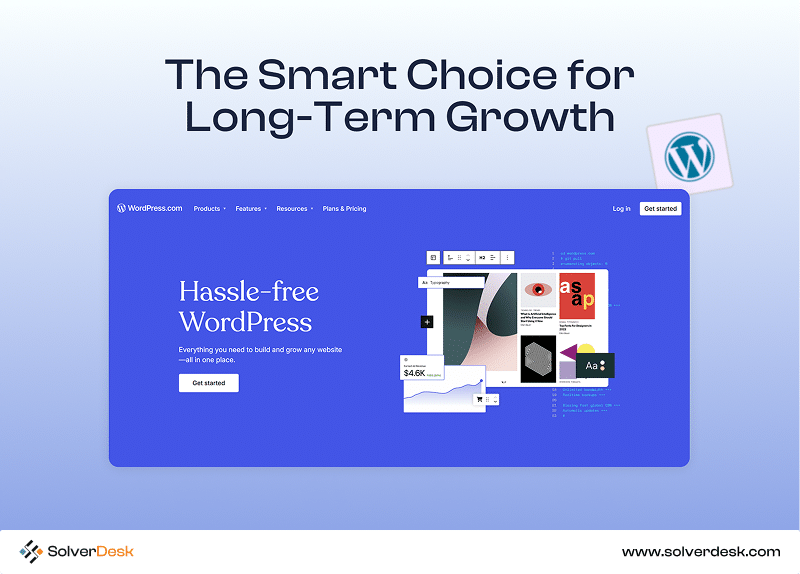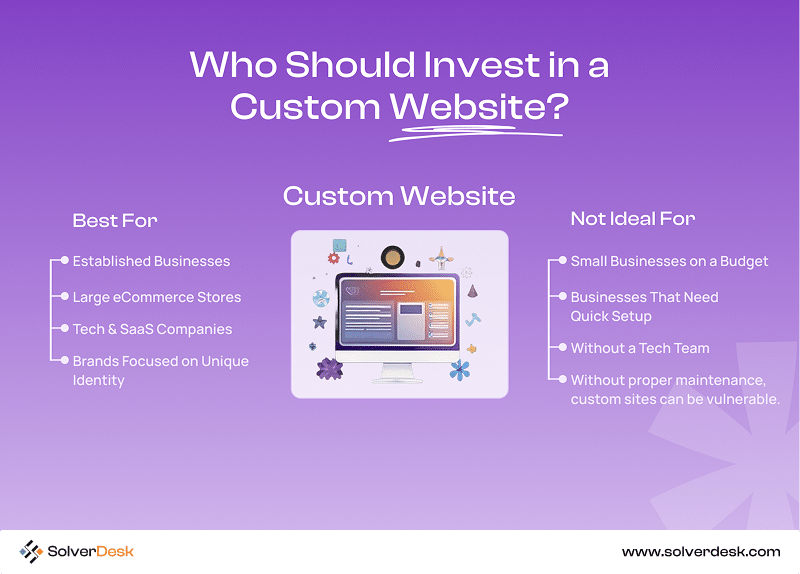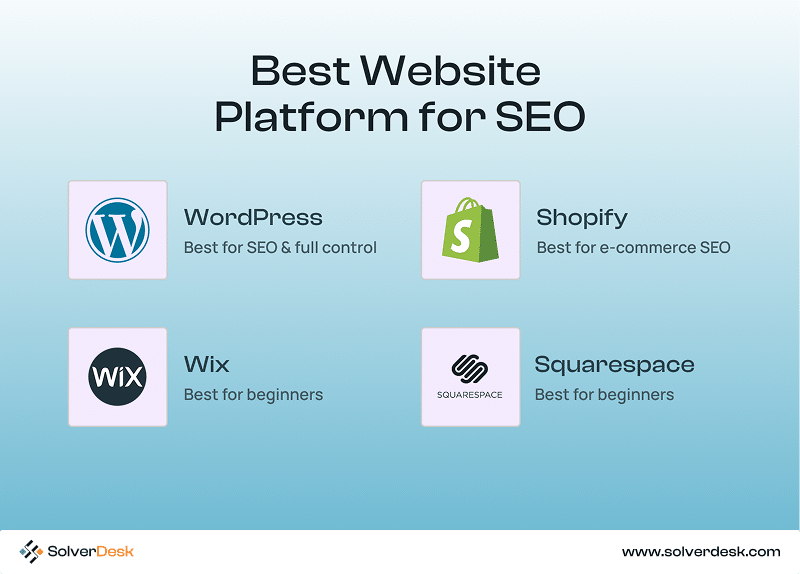What Makes a Best Website Platform for Your Business?
Is your website helping your business grow, or is it holding you back? A well-built website can boost SEO rankings, sales, and customer trust. However, choosing the wrong platform can lead to poor performance, low traffic, and security risks.
Here’s what to look for when picking the right platform:
Ease of Use – A website should be simple to manage, even for beginners. 38% of users leave a site if it’s hard to navigate (Forrester Research).
SEO-Friendliness – Built-in SEO tools, such as meta tags, sitemaps, and fast loading speed, help businesses rank higher. Google prioritizes sites that load in under 2.5 seconds.
Customization & Flexibility – A unique design makes you stand out. Platforms should allow branding, layouts, and plugin integrations.
Scalability – Your business will grow, and your website should, too. Platforms should be able to handle more pages, traffic, and features over time.
Security & Support – Cybercrime costs businesses $6 trillion annually (Cybersecurity Ventures). So, you need strong security and reliable support to protect your data.
The right website platform can be the difference between success and struggle. Are you making the best choice for your business?
Overview of Popular Website Platforms
Which website platform is right for your business? With so many options, choosing the best one can be confusing. Some platforms offer quick setups, while others provide advanced customization and SEO control. Let’s break them down:

Website Builders: Easy, But Limited
Platforms like Wix, Squarespace, and Shopify are designed for beginners.
Pros:
✔ Quick setup, no coding required.
✔ User-friendly drag-and-drop tools.
✔ Pre-designed templates for easy design.
Cons:
✖ Limited customization, hard to create a unique brand identity.
✖ Basic SEO settings, less control over technical optimization.
✖ Scalability issues can be expensive or restrictive for growing businesses.
Best for: Small businesses or entrepreneurs who need a simple website without long-term flexibility.
The downside? Once your business grows, you may outgrow these platforms and need to switch, which can be costly and time-consuming.

WordPress: The Smart Choice for Long-Term Growth
A WordPress-like platform offers the best of both worlds customization, SEO power, and scalability.
Pros:
✔ Full control over design and functionality.
✔ Powerful SEO tools, custom metadata, fast loading, and mobile optimization.
✔ Thousands of plugins for marketing, automation, and eCommerce.
✔ Scalable grows with your business, whether small or enterprise-level.
Cons:
✖ Requires some learning setup, and maintenance may take effort.
✖ Hosting and security must be managed separately.
Best for: Perfect for any business, it provides excellent SEO features, customization options, and marketing tools to improve search rankings, attract more visitors, and support ongoing success online. WordPress powers over 63% of websites worldwide, making it the most trusted and scalable platform for serious businesses.

Who Should Invest in a Custom Website?
Is a custom website worth the cost? Many businesses struggle with this decision. A custom website can give full control, unique branding, and advanced functionality, but it comes with higher costs and maintenance needs.
Best for:
Established Businesses – Companies with a strong brand and unique needs that standard platforms can’t meet.
Large eCommerce Stores – Businesses needing custom checkout flows, advanced inventory management, or special integrations.
Tech & SaaS Companies – Firms requiring custom applications, dashboards, or interactive tools.
Brands Focused on Unique Identity – If your website needs a unique look and feel, custom design is the way to go.
Not Ideal for:
Small Businesses on a Budget – A custom site can cost $5,000–$50,000+, making it impractical for startups.
Businesses That Need Quick Setup – Custom sites take weeks or months to build, while platforms like WordPress, Wix, or Shopify offer fast solutions.
Those Without a Tech Team – Custom sites require ongoing maintenance, security updates, and bug fixes.
The challenge? 43% of cyberattacks target small businesses (Verizon). Without proper maintenance, custom sites can be vulnerable.
Pros & Cons of a Custom Website
Pros:
✔ Fully customizable – No design or feature limitations.
✔ Better performance – Optimized for speed and SEO.
✔ Scalable – Grows with your business needs.
Cons:
✖ High upfront cost – Much more expensive than website builders.
✖ Requires technical knowledge – Needs a developer for updates.
✖ Longer development time – Can take months to launch.
Alternatives to a Custom Website
WordPress-like Platforms – Offer flexibility, SEO tools, and plugins without the high cost of custom development.
Website Builders (Wix, Squarespace, Shopify) – Quick and easy setup, great for small businesses with simple needs.
Headless CMS Solutions – Provide custom design flexibility while using backend platforms like WordPress or Shopify for content management.
Why Customization & SEO Friendliness Matter for Your Business
Everyone wants their website to stand out and grow their business. Customization and SEO friendliness are the main keys to branding and upgrading your business.
Customization for Branding & Growth
A customizable platform gives you full control over your website’s design. With a unique look and feel, your business can make a lasting impression on visitors. About 38% of users will leave a site if the layout is unattractive (Forrester).
Customization allows you to create a design that represents your brand and resonates with your audience. It is best for businesses that want a unique identity and need to scale their website as they grow.
Why SEO-Friendliness Matters
Choosing a platform with built-in SEO tools means you can optimize meta tags, sitemaps, and loading speed to help your site perform better.
Websites that load faster have a 15% higher conversion rate (Portent), and 93% of online experiences begin with a search engine (Search Engine Journal). SEO-friendly platforms ensure better user experience and higher rankings.
The Benefits of a Platform with an Extensive Plugin Ecosystem
Want to improve your website without expensive custom development? A platform like WordPress, known for its vast plugin ecosystem, allows businesses to enhance functionality, improve SEO, and grow seamlessly, all without coding.
With over 60,000 plugins available, WordPress allows you to add new features such as SEO tools, e-commerce capabilities, and automation. Small businesses often lack big budgets, but WordPress plugins provide cost-effective solutions for adding professional features without high expenses.
Websites using SEO plugins can see a 20–30% boost in search traffic (Moz). For example, a custom SEO solution might cost $5,000+, while Yoast SEO Premium costs under $100 per year.
70% of small businesses struggle with high web development costs (Clutch). WordPress offers free and premium plugins that keep costs low while maximizing functionality. Instead of paying thousands for custom-built tools, businesses can use WordPress plugins to achieve the same results at a fraction of the cost.
Content Management and SEO Optimization
Choosing the right website platform is key to managing content and optimizing SEO. Some platforms offer better control and built-in SEO tools, helping businesses boost rankings and grow online.
Control Over Content for Better SEO
A strong website platform lets businesses easily manage blogs, product pages, and landing pages, ensuring they stay optimized for SEO. Websites that publish high-quality content regularly get 434% more indexed pages on Google (TechJury). That means better visibility and higher traffic!
Businesses that need full control over content and frequent updates to improve SEO rankings.
Built-in SEO Tools for Higher Rankings
Platforms with built-in SEO features help businesses optimize their content without needing extra coding or expensive tools.
Key SEO features to look for:
Custom URLs – Helps Google understand page content.
Metadata control – Optimized title tags and descriptions improve click-through rates.
Sitemaps & indexing – Helps search engines crawl and rank pages faster.
A well-optimized website can increase organic traffic by 53% in just six months (BrightEdge).

Best Website Platform for SEO
Not all platforms offer the same SEO power. Let’s compare:
WordPress – Best for SEO & full control
- Over 63% of all websites run on WordPress.
- Supports Yoast SEO, Rank Math, and All-in-One SEO for deep SEO customization.
- Full control over content, metadata, and sitemaps for higher rankings.
WordPress sites rank higher on Google, 35% faster than non-optimized platforms (Backlinko).
Shopify – Best for e-commerce SEO
- Built-in SEO tools but limited customization compared to WordPress.
- Good for product SEO, but URL structures are less flexible.
Wix & Squarespace – Best for beginners
- User-friendly but lacks advanced SEO control.
- Limited ability to edit site structure and metadata for deeper SEO.
Branding and User Experience: Why Your Website Platform Matters
Your website is the face of your business online. A platform that allows custom branding, great user experience (UX), and mobile responsiveness can attract more customers.
Designs for Stronger Branding
A business needs a website that reflects its unique brand identity. A flexible platform allows you to customize layouts, colors, and features to create a memorable brand experience. 75% of users judge a company’s credibility based on its website design (Stanford University). If your site looks generic, visitors might not trust your brand.
User Experience (UX) for Higher Engagement
A well-designed website keeps visitors engaged and turns them into customers. Platforms with easy navigation, fast loading speeds, and clear layouts create a better UX.
Mobile Responsiveness: A Must for SEO & Customers
With over 60% of web traffic coming from mobile devices (Statista), a website must be mobile-friendly to stay competitive. A platform with responsive design ensures that your site looks great on all screen sizes. Google’s algorithm prioritizes mobile-friendly websites in search rankings. If your site isn’t responsive, it won’t rank well on Google.
Best Platforms for Branding, UX, and Mobile Responsiveness
WordPress – Best for full design control
- Thousands of themes and design options for full customization.
- Mobile-responsive themes that boost SEO rankings.
- Powerful UX tools for faster speed, better navigation, and improved engagement.
Shopify – Best for e-commerce brands
- Customizable storefronts.
- Good for product-based businesses needing an online store.
Wix & Squarespace – Best for quick website setup
- Easy drag-and-drop design but limited customization for advanced branding.
Best Website Platform for Your Business
A platform with strong SEO, scalability, and marketing integrations helps businesses grow online and reach more customers.
A business needs a platform that can grow with its needs. SEO, customization, and marketing tools make a website more powerful and profitable. 75% of users never scroll past the first page of Google (HubSpot). A website optimized for SEO has a higher chance of ranking and attracting customers.
Marketing Integrations: Connecting with More Customers
The best website platforms offer seamless integration with marketing tools to track visitors, run ads, and automate customer engagement.
Facebook Pixel & Google Analytics – Helps businesses track user behaviour and optimize ad campaigns.
Google Tag Manager – Simplifies the management of multiple tracking codes for better marketing insights.
Email Marketing Automation (Mailchimp, HubSpot) – Automates emails to engage leads and increase sales.
CRM Integration (Salesforce, Zoho) – Helps businesses manage customer relationships for better conversions.
Social Media & Ads – Platforms support LinkedIn, Twitter, and Instagram retargeting for better audience engagement.
Businesses using automation tools see a 77% increase in conversions (Salesforce).
Best Website Platforms for Business Growth
WordPress-Like Platforms – Best for SEO, scalability, and marketing
- Full control over SEO settings, plugins, and site performance.
- Highly scalable and flexible for all business types.
- Supports advanced marketing integrations to grow faster.
Shopify – Best for e-commerce
- Good for online stores.
- Limited SEO control compared to open-source platforms.
Wix & Squarespace – Best for small businesses
- Easy to use but with limited scalability and SEO control. Best platform for small business website.
Key Considerations When Choosing Your Platform
Selecting the right website platform is crucial for business success. The wrong choice can limit growth, affect SEO rankings, and increase costs.
1. Align with Business Goals – A platform should match your business size, long-term growth, and SEO needs. Example: 68% of online experiences start with a search engine (BrightEdge), so SEO-friendly platforms are essential.
2. Technical Expertise – Some platforms require coding knowledge, while others offer drag-and-drop simplicity. If you want full control over customization and SEO, choose an open-source, scalable platform.
3. Budget Planning: Factor in platform costs, plugins, hosting, and maintenance. For example, Businesses spend $1,000–$5,000 per year on website maintenance (TechJury).
Conclusion
Your website is the foundation of your business. Choosing the right platform can mean the difference between online success and missed opportunities. A platform with strong SEO, flexibility, and scalability ensures long-term growth and helps you stay ahead of the competition.
Take control of your digital future! Evaluate your business needs and choose a platform that offers SEO advantages, customization, and powerful integrations. A smart decision today can set your business up for higher rankings, more traffic, and lasting success. Build a website that grows with you!






